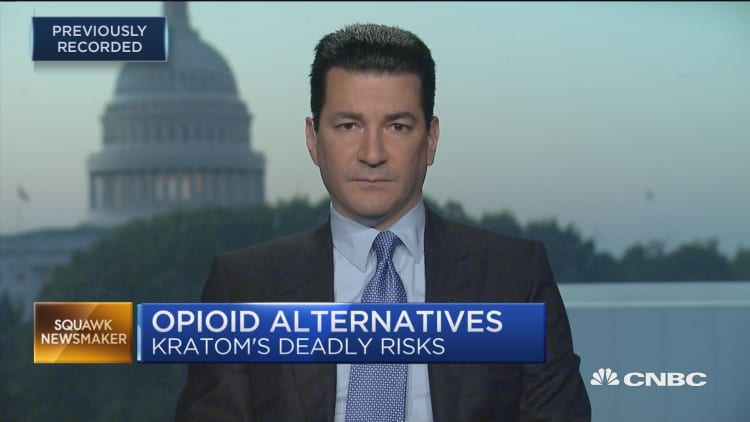
Food and Drug Administration Commissioner Scott Gottlieb warned on Wednesday that a widely used dietary supplement being used to combat opioid dependency could actually be fueling new addictions.
The agency said it is aware of reports of 36 deaths associated with the herbal supplement, which has gained popularity in the U.S. and can have similar effects to narcotics like opioids.
The FDA on Tuesday issued a public health advisory regarding risks related to kratom.
"We think it has addictive qualities," Gottlieb told CNBC's "Squawk Box." "It's also being used by people who have addictions to opioid drugs as a way to help them relieve their addiction. Some people using it as an adjunct to opioids."
"But we have a lot of concerns about it. We believe it is fueling new addiction," Gottlieb added. "We also believe that if it does have therapeutic benefits, and it can be helping people, we want to see the science that can help prove that."
Opioids, including prescription painkillers and heroin, played a role in more than 33,000 U.S. deaths in 2015, according to the Centers for Disease Control and Prevention.
Earlier this month, the FDA announced that it would look at ways to reduce exposure to the drug. President Donald Trump has declared the opioid crisis a public health emergency.
Kratom is already a controlled substance in 16 countries, including two of its countries of origin, Thailand and Malaysia, as well as Australia, Sweden and Germany. It is banned in several states, including Alabama, Arkansas, Indiana, Tennessee and Wisconsin.
Supporters of the supplement argue that it's a safe substance largely because it's a plant-based product, but the FDA is concerned there is no "reliable science" to prove the supplement has any benefits.
"We're holding it at the border," Gottlieb said. "We've impounded hundreds and thousands of this substance, but a lot of it is coming into the U.S. regardless. We've had concerns about this for a long time."
Gottlieb said the agency is working with the Drug Enforcement Administration to assess how the substance should be classified. "The [DEA] will make a scheduling decision based on our analysis," he said.
—Reuters contributed to this report.


